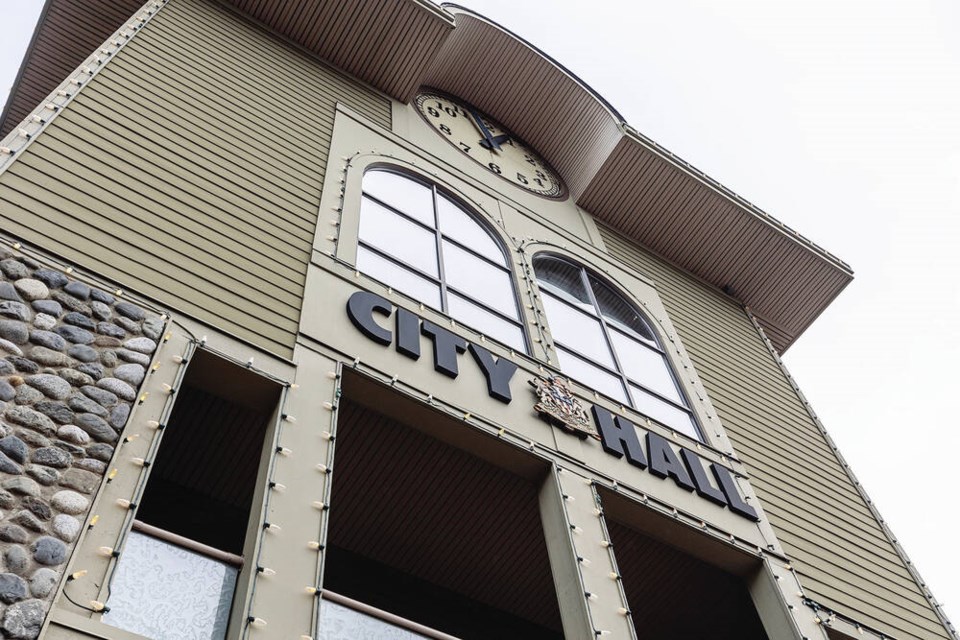A big red pickup truck was parked outside Langford City Hall on Monday festooned with signs opposing looming property tax hikes. About 60 protesters with signs joined in, then packed the chamber as council unanimously ratified a 15.6% tax hike — the largest increase of all 13 municipalities in the capital region this year and the second consecutive year that property owners in Langford have to absorb a double-digit hit.
“It’s a bad day for seniors, for single parents and the families of Langford who really can’t afford this,” said Lisa Foxall, a protest organizer. She said with interest rates and inflation already high, “people are struggling … we’re seeing more and more people use food banks in Langford and we’re concerned. None of these council members seem to care about that.”
Council had approved the 15.6% hike in March and on Monday officially passed the city’s $81-million budget and five-year financial plan for the city of about 50,000.
The tax hike will help to cover the cost of hiring five new RCMP officers, nine firefighters, and other city staff.
It will subsidize the YMCA aquatics facility, and cover asset management, internal borrowing and debt repayment, additional operating and maintenance costs, and rising prices due to inflation.
“It’s a big hit percentage wise and, politically, it hasn’t been popular,” said Langford Coun. Keith Yacucha.”The easy thing to do on the personal and political side is to keep taxes low. But for the long run and financial stability of the city, [raising taxes is] important to do for the whole community to provide the services residents need.”
Council’s initial plan in February called for an 11.79% increase in property taxes, but it decided to go higher after opting not to use general amenity funds to soften the hike.
Councillors who toppled former mayor Stew Young and other long-time councillors in the last civic election said previous administrations were using general amenity funds — money paid by developers intended for public projects — to keep taxes low and that practice was ending.
Over the past decade, council said, more than $10 million has been drawn from the amenity reserve fund to offset property-tax increases, a practice that Yacucha described in March as “robbing from our children.”
Council decided instead to budget $1.4 million in 2024 and $1.85 million in 2025 for sidewalks around schools with funds from the amenity reserves, instead of using the money to lessen the tax increase.
The 15.6% leap in property taxes follows a nearly 12% increase last year. The tax hikes have divided the community, drawing protests and negative feedback during public-participation portions of council meetings.
Yacucha said the 15.6% increase equates to a $327 increase for the average home in Langford, valued at just over $1 million, where property taxes this year would come to $2,422.
That puts Langford in the middle of the pack of the 13 municipalities, which Yacucha called fair considering its size, rapid growth and services it provides. Yacucha noted that owners in Oak Bay with a representative home valued at about $2 million will see an increase of $490 this year for a total of $5,553 in taxes. Saanich, where an average home is valued at $1.3 million, will see an increase of $270, and a bill of $3,681.
The average tax bill under recent financial plans passed in all 13 municipalities is $2,914 — about $500 less than for the average Langford property owner, according to Yacucha
Under a five-year financial plan, Langford property taxes are forecast to rise 10.84% next year and in subsequent years go up 6.91%, 7.47% and 2.43% through to 2028.
Young, who spent 30 years as mayor of Langford, said a 28% tax increase in two years is “unacceptable.” He said he never raised taxes more than 3.5% over his seven terms, and held it at zero for 10 years while he built the city up. “I wanted to make sure I kept money in people’s pockets, not rob them,” said Young. “It’s easy to raise taxes. You’ve got to look for other revenue, that’s the hard work. They could have raised user fees for permits and construction.”
>>> To comment on this article, write a letter to the editor: [email protected]



